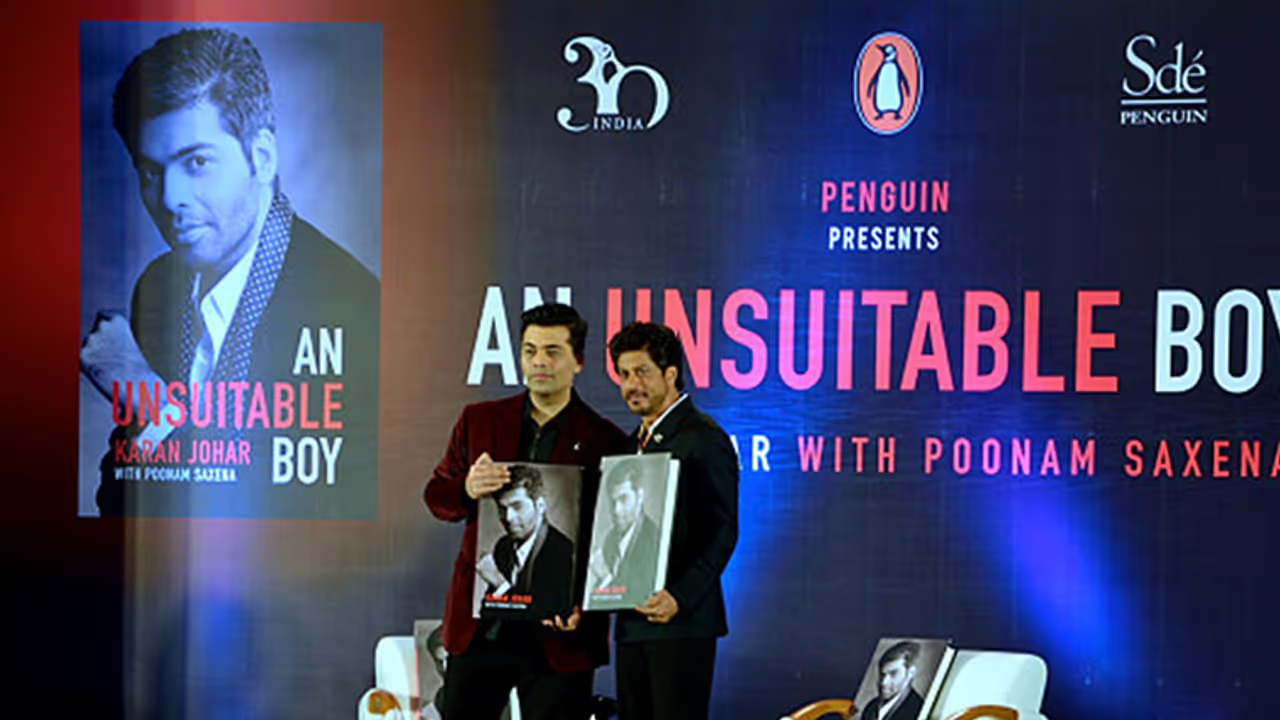Karan Johar's autobiography is exactly like his films - light and fun. While not going into great details, it touches on every aspect of his life. Ultimately you feel like you have just had a coffee, and long chat, with Karan,
Title: An Unsuitable Boy
Author: Karan Johar with Poonam Saxena
Price: ₹699
Publisher: Penguin
Rating: 3.5/5

The dust jacket of the hardbound edition of Karan Johar's 'An Unsuitable Boy', features the obligatory explanation about who he is (he has directed six films and produced 20 others, it declares). This feels a bit out of place and amusing since it is hard to imagine anyone in India who does not know who Karan Johar is.
For 20 years now, he has been a topic of Indian dinner tables, and not once can those discussions be considered intellectual - or even close to it. The fact that he has been the topic, and his angst at still not being considered a 'good' topic, form the bulk of this semi-biography.
The best parts only begin on page 30 - when he begins his film journey as an Assistant Director in Aditya Chopra's legendary 'Dilwale Dulhania Le Jayenge'. Much of the book before that is rambling look at his life, which will only be of interest if you are really THAT big a Karan Johar fan.
The meat of the matter is how he made his films, what he thought about each of them and his general reflections about Bollywood in general and the people in his life (SRK gets a whole chapter to himself).
At only 216 pages in large font, this is no in-depth musings. It is more like a series of chats over coffee, transcribed. Since he mentions in the book that he never writes anything (only dictates) and the book is co-written by Poonam Saxena, a weekend editor with the Hindustan Times, this is probably exactly how this book was written as well.
The book mostly functions as a really, really extended interview. Much like his films, the book is high on entertainment and is quick and easy to consume, but low on the kind of 'intellectual' thoughts that he spends a good amount of time dismissing in the book.
On the plus side, it is certainly a must read if you are even slightly a Bollywood film buff, and a good read for those casual hours spent in airports or trains. On the minus side, the lack of depth gets really frustrating at some points.
For example, he mostly skips over the process of actually filming movies with simple lines like "...everything went smoothly...", but spends pages and pages telling us in great detail exactly what his relationship with Shah Rukh Khan is. Perhaps that is of interest to many people, but a book by a filmmaker should ideally have contained more about filmmaking.
But what is there is fascinating nevertheless. The harsh realities of being a 'flop' producer's son, the difficulties in making films and the ease with which they flop - destroying years of work and possibly involving bankruptcy - is a side of filmmaking few consider amid all the glitz and glamour. The one thing that shines through it all is his amazing relationship with his father and mother, which is quite moving.
But the absolute best parts are Karan's rants. He has passionate feelings about things like critical acclaim (he is deeply wounded that critics dismiss him as fluff), relationships in the industry (he admits they are hard to keep), his own personal sex life (laying bare the difficulties of someone with his sexuality in a country like India) and the attitude of young actors today (whom he castigates of being too PR managed). These rants feel honest, and you find yourself nodding in agreement more than once.
Only in his mid-forties, this is naturally a short look back at his life. Perhaps he will write another one when he is eighty, and we will get more nuanced musings. But for now, the book will tell you what Karan Johar is thinking and feeling currently.
Considering the immense impact he has had on Indian cinema and culture over the past two decades, a book just on that much is still worth a read.
